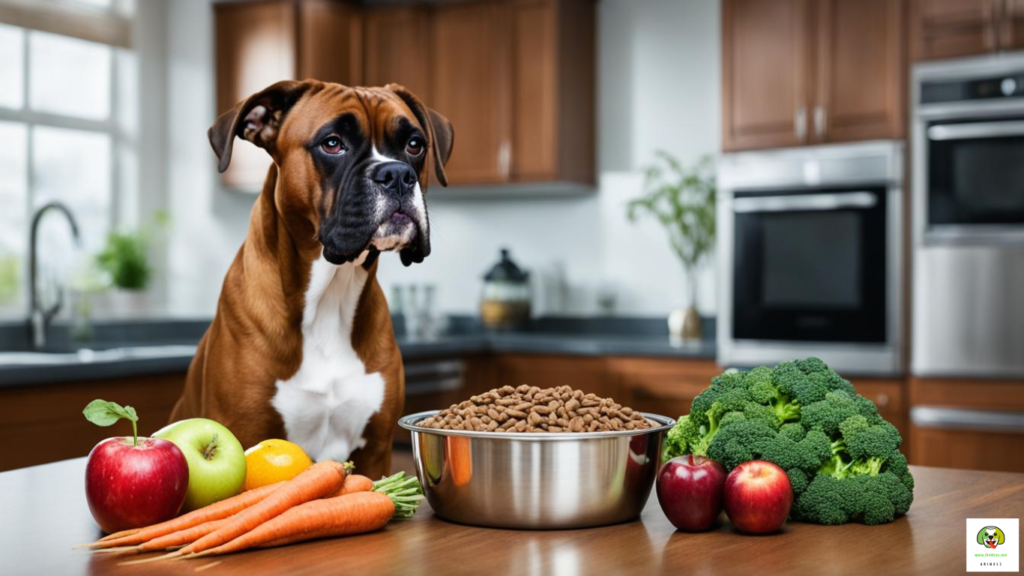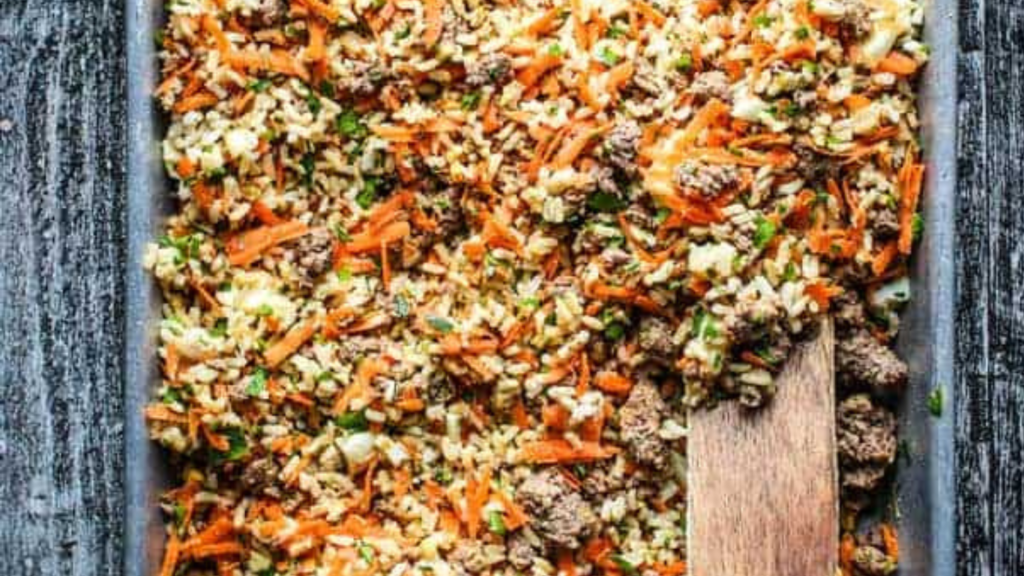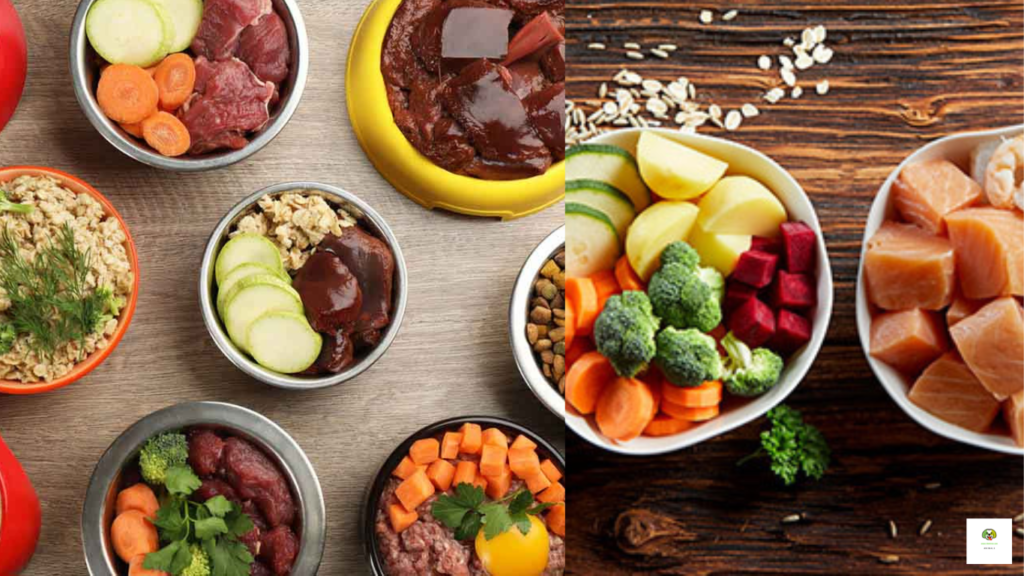Introduction
If you’ve ever wondered, “What do Boxer dogs eat?” you’re not alone! Boxers are energetic, playful companions with unique dietary needs to support their active lifestyles. Whether you’re a new owner or looking to refine your furry friend’s meals, understanding their nutritional requirements is key to keeping them healthy and happy.
Boxers thrive on high-quality protein, balanced fats, and digestible carbohydrates, but their sensitive stomachs mean not all foods are safe. From avoiding common allergens to ensuring proper portion sizes, this guide dives into everything you need to know about feeding your Boxer. We’ll explore the best foods for puppies, adults, and seniors, decode ingredient labels, and share practical tips to prevent obesity and allergies. Let’s make mealtime a joy for your Boxer while boosting their energy, muscle health, and longevity!
Understanding a Boxer’s Dietary Requirements

Boxer dogs are energetic, muscular, and full of life, which means their diet needs to fuel their active lifestyle while supporting their unique health needs. Like all breeds, Boxers thrive on a balanced diet rich in high-quality proteins, healthy fats, digestible carbohydrates, and essential vitamins and minerals. However, their specific requirements often differ due to their high energy levels, sensitive stomachs, and predisposition to certain health issues like heart conditions or joint problems.
Protein is the cornerstone of a Boxer’s diet. As athletic dogs, they need ample animal-based protein (like chicken, beef, or fish) to maintain lean muscle mass and support their metabolism. Look for dog foods where protein is the first ingredient, avoiding vague terms like “meat by-products.” Healthy fats, such as omega-3 and omega-6 fatty acids from fish oil or flaxseed, are equally vital. These nutrients promote a shiny coat, healthy skin, and support brain function while reducing inflammation—a bonus for Boxers prone to joint issues.
Carbohydrates should come from easily digestible sources like brown rice, sweet potatoes, or peas. Many Boxers have sensitive digestive systems, so grains like corn or wheat may cause allergies or upset stomachs. Always monitor your dog for signs of food intolerance, such as itching or digestive discomfort. Fruits and vegetables (like blueberries, carrots, or spinach) add fiber and antioxidants, aiding digestion and boosting immunity.
Boxers are also prone to bloating, so smaller, frequent meals are better than one large serving. Avoid overfeeding, as obesity strains their joints and heart. Supplements like glucosamine can support joint health, while taurine—an amino acid—may benefit heart function.Before introducing any supplements, it’s essential to consult your veterinarian.
Finally, fresh water is non-negotiable. Hydration keeps their energy levels steady and aids digestion. Steer clear of artificial additives, fillers, or excessive preservatives. A tailored, nutrient-dense diet not only keeps your Boxer healthy but also enhances their playful spirit and longevity.
Essential Nutrients for Optimal Health
Boxer dogs are energetic, muscular, and playful companions, which means their diet needs to fuel their active lifestyle while supporting their overall well-being. Just like humans, Boxers thrive when their meals are balanced with the right mix of nutrients. Let’s break down what your Boxer needs to stay healthy and happy.
Protein is the cornerstone of their diet. As a breed with a strong, athletic build, Boxers require high-quality animal-based proteins like chicken, beef, fish, or turkey to maintain muscle mass and repair tissues. Look for dog foods where protein is the first ingredient, ensuring they get at least 18-22% protein in their daily intake. Fats are equally vital—they provide energy and support skin and coat health. Omega-3 and Omega-6 fatty acids, found in fish oil or flaxseed, reduce inflammation and keep their short coat shiny.
Aim for healthy fats to make up about 10-15% of their diet. Carbohydrates often get a bad rap, but the right kind—think sweet potatoes, brown rice, or oats—delivers sustained energy for their zoomies and play sessions. These complex carbs also aid digestion and keep their gut happy. Fibre, from sources like pumpkin or green beans, is another unsung hero, preventing constipation and promoting a healthy digestive system.
Don’t overlook vitamins and minerals. Calcium and phosphorus strengthen bones and teeth, crucial for a breed prone to joint issues. Vitamins A, C, and E boost immunity and act as antioxidants, while zinc and iron support metabolic functions. Most commercial dog foods are fortified with these nutrients, but if you’re preparing homemade meals, consult your vet to avoid deficiencies.
Hydration is non-negotiable. Always ensure fresh water is available, especially after exercise or on hot days. Portion control matters too—Boxers love food but can easily gain weight, leading to strain on their heart and joints. Stick to measured meals twice a day rather than free feeding. Lastly, steer clear of harmful ingredients like chocolate, grapes, onions, or excessive salt. Tailor their diet to their life stage: puppies need more calories and protein, and seniors may benefit from glucosamine supplements for joint health.

When in doubt, your veterinarian can help craft a meal plan that’s as unique as your Boxer’s personality. By focusing on these essentials, you’ll keep your Boxer’s tail wagging and their energy levels soaring for years to come!
Recommended Diet Plans for Different Life Stages
Boxer dogs go through distinct life stages, each with unique nutritional demands. Tailoring their diet to these phases ensures they grow strong, stay energetic, and age gracefully. Let’s explore how to nourish your Boxer from puppyhood to their golden years.
Puppies (up to 12-18 months) require calorie-dense meals packed with protein and fats to fuel their rapid growth and boundless energy. Look for puppy formulas with 25-30% protein from sources like chicken, lamb, or salmon, which support muscle and bone development.
Frequent, small meals (3-4 times daily) prevent hypoglycemia, a common issue in large-breed pups. Calcium and phosphorus ratios must be balanced to avoid skeletal problems and added DHA (found in fish oil) aids brain and vision development.
Avoid overfeeding—excess weight can stress their developing joints. Adults (1-7 years) thrive on a balanced diet that maintains their athletic physique without excess calories. Opt for high-quality kibble or fresh food with 18-22% protein and moderate fat (10-15%) to sustain energy. Active Boxers may benefit from formulas with glucosamine and chondroitin to protect joints during play.
Portion control is key—split meals into two servings to prevent bloat, a risk in deep-chested breeds. Incorporate fibre-rich veggies like carrots or spinach for digestion, and adjust portions based on activity level. A sedentary Boxer might need fewer carbs, while a working dog could require extra calories. Seniors (7+ years) often need fewer calories but more targeted nutrients.
Switch to senior-specific formulas with easily digestible proteins (e.g., turkey, eggs) to maintain muscle mass without straining kidneys. Lower fat content (around 10%) helps manage weight, while added glucosamine, MSM, and omega-3s ease arthritis pain and keep joints mobile. Senior Boxers may develop sensitive stomachs, so probiotic-rich foods or pumpkins can aid digestion.
Monitor for dental issues—softening kibble or adding wet food might help. Regardless of age, always avoid toxic foods (chocolate, onions, grapes) and prioritize fresh water. Transition diets gradually over 7-10 days to avoid tummy upsets. Regular vet check-ups help fine-tune their meals, ensuring your Boxer’s diet evolves alongside their needs. By adapting their nutrition at every stage, you’ll support a lifetime of tail wags, playfulness, and vitality!
Best Commercial Dog Food Options for Boxers
When asking, “What do Boxer dogs eat?” the answer lies in choosing commercial foods that cater to their unique needs: high energy, muscle maintenance, and joint health. Boxers thrive on diets rich in animal protein, healthy fats, and digestible carbs, but not all kibble or canned foods are created equal.

Here’s how to pick the best options for your pup. Look for brands that list real meat (chicken, beef, salmon, or turkey) as the first ingredient. Protein should make up 18-25% of the formula to support their athletic build. Avoid fillers like corn, soy, or artificial preservatives, which can trigger allergies or digestive issues common in Boxers.
Trusted options often include Orijen, Blue Buffalo Wilderness, or Taste of the Wild, which focus on high-quality, grain-free recipes packed with nutrients. For Boxers prone to sensitive stomachs, limited-ingredient diets like Natural Balance L.I.D. or Hill’s Science Diet Sensitive Stomach work wonders.
These formulas minimize allergens while providing balanced nutrition. Joint support is another priority—foods fortified with glucosamine, chondroitin, or omega-3 fatty acids (like Purina Pro Plan Sport or Royal Canin Boxer Breed) help protect their active hips and knees. Puppies and seniors have specialized needs.
Puppy formulas like Wellness CORE Grain-Free Puppy offer extra calories and DHA for brain development, while senior blends such as Nutro Wholesome Essentials Senior include fewer calories and added fiber for aging metabolisms. Always check for AAFCO certification to ensure the food meets nutritional standards.
Wet food can be a tasty supplement or alternative—opt for high-moisture options like Merrick Backcountry or Canidae Grain-Free Pate to keep your Boxer hydrated. Remember, portion control is key! Follow feeding guidelines based on weight and activity level to prevent obesity.
When in doubt, consult your vet to match your Boxer’s age, health, and lifestyle to the right food. By prioritizing quality ingredients and breed-specific formulas, you’ll answer “what do Boxer dogs eat?” with confidence, ensuring they stay strong, playful, and healthy for years!
Common Food Allergies and Sensitivities in Boxers
Boxer dogs, with their playful energy and loyal nature, thrive when their diet supports their active lifestyle. However, like many breeds, Boxers can develop food allergies or sensitivities that impact their health and happiness. Understanding these issues is key to ensuring your furry companion stays healthy and comfortable.
Food allergies in Boxers often stem from proteins like beef, chicken, dairy, or fish, which are common ingredients in commercial dog foods. These allergies trigger an immune response, leading to symptoms such as itchy skin, ear infections, chronic licking of paws, or gastrointestinal upset like vomiting and diarrhea.
Sensitivities, on the other hand, are non-immune reactions to ingredients like wheat, corn, soy, or artificial additives, causing similar symptoms but without the immune system’s involvement. Boxers may also struggle with grains or fillers in low-quality kibble, which can irritate their digestive systems over time.
Identifying the culprit requires patience. Start by eliminating suspected allergens from your dog’s diet for 8–12 weeks, under veterinary guidance, and reintroduce ingredients one by one to observe reactions.
Hypoallergenic or limited-ingredient diets featuring novel proteins (e.g., duck, venison, or kangaroo) and easily digestible carbs like sweet potatoes are often recommended. Always check labels for hidden allergens—even “grain-free” foods might use peas or lentils, which some Boxers struggle to digest.
If your Boxer shows persistent symptoms like red skin, hair loss, or recurring ear issues, consult a vet. They may recommend allergy testing or prescribe specialized diets. Remember, every Boxer is unique—what works for one dog may not suit another.
Prioritize high-quality, balanced nutrition tailored to their needs, and avoid table scraps or overly processed treats. With careful attention to their diet, you can help your Boxer live a vibrant, itch-free life!
Portion Control and Feeding Schedule
Boxer dogs are energetic, muscular companions with specific dietary needs that require careful attention to portion sizes and meal timing. Overfeeding can lead to obesity, which strains their joints and increases health risks while underfeeding might leave them lacking the fuel they need to stay active.

The key is to strike a balance tailored to your Boxer’s age, weight, activity level, and the type of food you’re offering. Adult Boxers typically thrive on 2.5 to 3.5 cups of high-quality dry kibble daily, divided into two meals. Puppies, however, need smaller, more frequent portions—three to four meals a day—to support their rapid growth without overwhelming their tiny stomachs.
As they transition to adulthood (around 12–18 months), you can gradually reduce feedings to twice daily. Always check the calorie content on your dog food’s packaging, as brands vary. For instance, nutrient-dense formulas may require smaller portions, while grain-free or weight-management options might need adjustments.
If you’re incorporating homemade meals or wet food, consult your vet to ensure proper calorie calculations. Timing matters just as much as quantity. Stick to a consistent schedule, such as breakfast at 7 AM and dinner at 6 PM, to regulate digestion and prevent begging. Free-feeding (leaving food out all day) is risky for Boxers, as their enthusiastic appetites can lead to overeating. Senior Boxers (7+ years) may need lighter, easily digestible meals if they have slower metabolisms or dental issues.
Treats are fine in moderation—opt for healthy snacks like carrot sticks or lean meat bites—but keep them under 10% of their daily calories to avoid disrupting their balanced diet. Always provide fresh water, especially after exercise, as Boxers are prone to overheating. Regularly monitor your dog’s weight and adjust portions if you notice weight gain or loss.
A healthy Boxer should have a visible waistline and ribs you can feel (but not see) under a light layer of muscle. When in doubt, work with your vet to fine-tune their plan. A structured feeding routine not only supports their physical health but also strengthens their bond through predictable, positive interactions. Remember, every Boxer is unique—stay observant, stay flexible, and they’ll thrive!
Homemade Diet: Pros and Cons
Feeding your Boxer a homemade diet has become a popular choice for pet parents who want more control over their dog’s nutrition. While this approach offers several benefits, it also comes with challenges that require careful consideration.
Let’s break down the pros and cons to help you decide if it’s the right fit for your furry friend. One major advantage of a homemade diet is the ability to tailor meals to your Boxer’s unique needs.
You can use fresh, high-quality ingredients like lean meats (chicken, turkey), whole grains, and veggies, avoiding preservatives, artificial colors, or low-quality fillers often found in commercial kibble. This is especially helpful for Boxers with food allergies or sensitivities, as you can eliminate common triggers like corn, soy, or certain proteins.
Homemade meals may also improve digestion, energy levels, and coat health when balanced correctly. However, crafting a nutritionally complete diet isn’t as simple as tossing leftovers into a bowl. Boxers require precise ratios of protein, fats, carbs, vitamins, and minerals to support their active lifestyles and prevent health issues like hip dysplasia or heart conditions.
For example, taurine—a nutrient critical for heart health—must be included in adequate amounts. Without guidance from a vet or canine nutritionist, homemade diets risk deficiencies or imbalances that could harm your dog over time. Another downside is the time and effort involved.
Preparing meals daily (or in bulk) demands commitment, and sourcing quality ingredients can be costlier than buying commercial dog food. Storage and portioning also require planning to ensure freshness and consistency.
In short, while a homemade diet can be a wholesome option for Boxers, it’s not a “set it and forget it” solution. Partnering with a professional and staying informed is key to keeping your pup happy, healthy, and thriving.
Supplements for Enhanced Health and Performance
Boxer dogs are energetic, muscular companions with unique nutritional needs that go beyond their daily meals. While a balanced diet is the foundation of their health, certain supplements can boost their vitality, support their active lifestyle, and address breed-specific concerns.
Think of supplements as a “safety net” to fill nutritional gaps or enhance their overall well-being—but always consult your vet before introducing anything new.
Omega-3 fatty acids, like fish oil, are a top pick for Boxers. They promote a shiny coat, reduce skin allergies (a common issue in the breed), and support joint health. For Boxers prone to hip dysplasia or arthritis, glucosamine and chondroitin supplements can ease stiffness and improve mobility.

Probiotics are another game-changer, aiding digestion and strengthening the gut—especially helpful for Boxers with sensitive stomachs.
Antioxidants like vitamins C and E help combat inflammation and boost immunity, which is vital for high-energy dogs. If your Boxer is highly active or participates in dog sports, consider adding a canine-specific multivitamin to ensure they’re getting essential nutrients like B vitamins for energy metabolism. However, avoid over-supplementing—more isn’t always better.
For muscle recovery post-exercise, branched-chain amino acids (BCAAs) can reduce fatigue, while coconut oil provides healthy fats for sustained energy. Always prioritize quality: choose supplements with natural ingredients and clear dosage guidelines. Remember, supplements work best alongside a protein-rich, balanced diet tailored to your Boxer’s age, weight, and activity level.
Lastly, never skip regular vet check-ups to tailor supplement plans to your dog’s evolving needs. A proactive approach today ensures your Boxer stays playful, healthy, and ready to tackle every adventure!
Hydration and Its Importance
Just like humans, Boxer dogs rely on water to keep their bodies functioning smoothly. Hydration plays a starring role in nearly every bodily process—from aiding digestion and nutrient absorption to regulating body temperature and flushing out toxins. For active, energetic breeds like Boxers, staying hydrated is even more critical.
Their playful nature and muscular build mean they burn energy quickly, often leading to faster water loss through panting and physical activity. Without enough water, even a small dip in hydration can lead to fatigue, dry gums, or more serious issues like kidney strain or heatstroke.
But how do you ensure your Boxer stays hydrated? Start by keeping fresh, clean water available at all times. Refill bowls daily and wash them regularly to prevent bacteria buildup. Monitor their intake—Active boxers may need more water after exercise, walks, or playtime.
During hot weather, add ice cubes to their bowl or offer a splash of water-rich foods like cucumber (in moderation) to make hydration fun. Watch for subtle signs of dehydration: lethargy, sunken eyes, or skin that doesn’t snap back when gently pinched.
Remember, hydration isn’t just about water—it’s about balance. Overhydration is rare but possible, so avoid forcing large amounts of water at once. Instead, encourage consistent sipping throughout the day.
Pair proper hydration with a balanced diet, as moisture-rich foods like wet dog food or broth can supplement their fluid intake. By prioritizing hydration, you’re not just quenching their thirst—you’re supporting their joints, digestion, and overall vitality, helping your Boxer stay as lively and loving as they’re meant to be.
Tips for Maintaining a Balanced Diet for Your Boxer
Ensuring your Boxer thrives starts with a balanced diet tailored to their unique needs. As energetic, muscular dogs, Boxers require meals rich in high-quality protein to support muscle health and energy levels.
Opt for lean meats like chicken, turkey, or fish, and consider incorporating plant-based proteins like lentils for variety. Pair these with complex carbohydrates such as sweet potatoes or brown rice, which provide steady energy without spiking blood sugar.

Healthy fats, like omega-3 fatty acids from fish oil or flaxseed, are vital for maintaining a glossy coat and supporting brain function. Portion control is key to preventing obesity, a common issue in Boxers that can strain their joints. Stick to feeding guidelines based on your dog’s age, weight, and activity level, and avoid free-feeding.
Treats should make up no more than 10% of their daily intake—try nutrient-packed options like carrot sticks or apple slices (seedless) instead of processed snacks. Hydration is equally important; always ensure fresh water is available, especially after exercise. Be mindful of foods toxic to dogs, including chocolate, grapes, onions, and anything containing xylitol.
If your Boxer shows signs of allergies—like itching or digestive upset—work with your vet to identify triggers, which could include common ingredients like wheat or soy. For seniors, consider adding joint-supporting supplements like glucosamine.
Finally, choose high-quality commercial dog food with recognizable ingredients and avoid fillers like corn or artificial additives. Rotate protein sources occasionally to keep meals exciting and reduce allergy risks.
Regular vet check-ups will help fine-tune their diet as they age. By prioritizing balance and consistency, you’ll fuel your Boxer’s playful spirit and promote a long, healthy life.
Read thers also
Are Pitbulls Good with Kids? The Truth About Their Loyalty & Temperament
Top 10 best dog breeds for protection and family 2025
What Is the Strongest Dog on Earth? Meet the Canine Titans of Strength
Should I get a dog or cat? Here’s How to Know Which One’s Right for You
FAQ
Boxer dog should avoid chocolate, grapes, raisins, onions, garlic, caffeine, alcohol, xylitol (in sugar-free gum/candies), avocado, macadamia nuts, and fatty/spoiled foods. Cooked bones can splinter and harm their digestive tract. Always check ingredients and avoid sharing salty/sugary snacks. When in doubt, consult your vet for safe treat options!
Boxers are energetic but can develop habits like chewing furniture, jumping on people, or excessive barking if bored or under-stimulated. They may show stubbornness in training or separation anxiety, leading to destructive behavior. Proper exercise, consistent training, and mental engagement help curb these tendencies. Supervision around small pets/kids is advised due to their playful, boisterous nature.
Boxers can have a mild “doggy” smell, but it’s usually manageable. Their short coat traps less odor than heavy-furred breeds, but skin folds may hold moisture or dirt. Regular baths (every 4-6 weeks), wiping wrinkles, ear cleaning, and dental care help keep odors down. Diet and health also play a role—quality food and vet checks ensure they stay fresh!
Boxer dogs typically live 9–12 years, though some reach 13–15 with excellent care. Proper diet, regular exercise, and routine vet check-ups boost longevity. They’re prone to heart issues and cancer, so early detection matters. A loving, active home and avoiding overexertion in heat help keep them healthy and happy throughout their lives.
Boxer dogs commonly face health issues like cancer (especially lymphoma or mast tumors) and heart disease (like cardiomyopathy) as leading causes of death. Regular vet checkups, early detection, and a healthy lifestyle can help manage risks.


Help me get 1000 subscribers – https://t.me/+8YD4vOIJpnk4ZmVh
In my channel I share information about promotion, marketing, crypto and personal life.
Thank you, good person!
Heider
Современные и стильные светодиодные светильники для дома, офиса и производства
производство светильников светодиодного освещения [url=http://proizvodstvo-svetodiodnih-svetilnikov.ru/]http://proizvodstvo-svetodiodnih-svetilnikov.ru/[/url] .
Закажите разработку ППРК у экспертов с опытом в промышленных проектах
ппрк проект производства работ кранами [url=http://www.pprk-msk.ru/]http://www.pprk-msk.ru/[/url] .